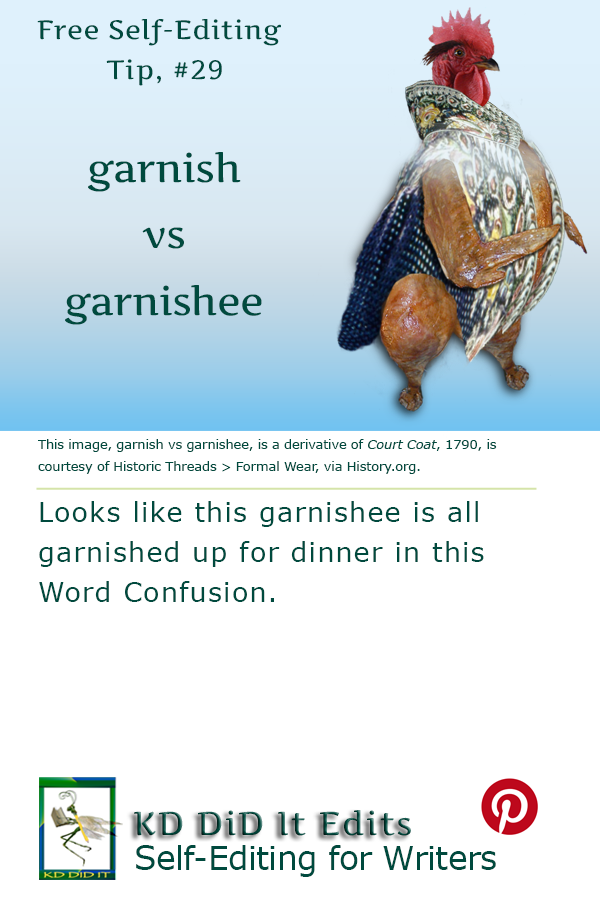I’ve done it again. Got all up in my own self-righteous belief that garnish and garnishee are two different critters. Turns out that in legal terms, you can garnish or garnishee, ya just can’t garnishee up that garnish order with flourishes and pretty scribbles. That’d be strictly garnish on a garnishee order.
Food, on the other hand, is strictly for garnish.
I gotta say, I do interpret garnish as strictly prettifying. When I read that his wages were garnished, I get to wondering what they were garnished with . . . a white paper frill? Or maybe with parsley . . . Now, on the other hand, if a couple of es got added in there to make it more of a his wages were garnisheed, I get to wondering how much is being taken out of the poor bastard’s pay.
And yes, part of me is looking for justification in this post for my own perceptions, aaand writers do need to take into account the most common word choices for word confusions like garnish and garnishee. Admittedly, it’s not a word choice one finds in most stories, which means that most of your reading audience won’t know the difference either, which makes it your choice.
Word Confusions . . .
. . . started as my way of dealing with a professional frustration with properly spelled words that were out of context in manuscripts I was editing as well as books I was reviewing. It evolved into a sharing of information with y’all. I’m hoping you’ll share with us words that have been a bête noire for you from either end.
If you found this post on “Garnish versus Garnishee” interesting, consider subscribing to KD Did It, if you’d like to track this post for future updates.
| Garnish | Garnishee |
|---|---|
 |
GARNISHEE ORDER
|
| Part of Grammar: | |
| Noun 1; Verb, transitive 1, 2
Plural for the noun: garnishes Third person present verb: garnishes |
Noun; Verb, transitive
Plural for the noun: garnishees Third person present verb: garnishees |
| Noun: A decoration or embellishment for something, especially food 1 [Obsolete] A fee, especially one formerly extorted from new prisoners by inmates of English jails or by the jailer Verb, transitive:
Decorate or embellish something, especially food 2 |
Noun: A third party who is served notice by a court to surrender money in settlement of a debt or claim [As a modifier] A garnishee order Verb, transitive:
|
| Examples: | |
| Noun: I do like using edible flowers as a garnish. The amount and style of garnish applied to clothing has varied throughout history. I do like a well-garnished joint of roast beef on a hot dish. Verb, transitive: The IRS garnished his earnings. During the Regency period, men wore knee breeches and jackets that were highly garnished for formal events. |
Noun: We need to serve this garnishee order. Oh yay! The judge issued a garnishee order. The payroll department handles garnishee orders. Verb, transitive: My ex is gonna get his wages garnisheed. |
| Derivatives: | |
| Adjective: garnishable Noun: garnisher, garnishment Verb, transitive: overgarnish, regarnish, undergarnish |
Noun: garnishment |
| History of the Word: | |
|
Middle English as a derivative word from garnish and from the Germanic warnjan meaning to guard through the Old French garnir. |
C’mon, get it out of your system, bitch, whine, moan . . . which words are your pet peeves? Also, please note that I try to be as accurate as I can, but mistakes happen or I miss something. Email me if you find errors, so I can fix them . . . and we’ll all benefit!
This word confusion — some time vs sometime vs sometimes — seems easy, at first, to chat about, but then those differences between sometime and sometimes seem a bit minute.
Some time is easy enough, as it’s used to indicate a great length of time. To convey the impression that the event has gone on for ages. We talked for hours, the summit went on for days, he bored on forever *grin*.
Then we get to sometime. It’s almost dismissive. A one time or a now-and-then sort of feel.
Sometimes is more upbeat with its sense of every once in a while. As well, lol, it feels as though there’s a bit of a surprise in it when someone uses it.
I know that sometimes I go on and on about a word confusion, and at some times, I’m rather brief. That’s the nature of the wordplay — and my mood at the time!
There will be a sometime when I may actually come to an end with the confusions, but as I look over my list of still-to-comes, it will be some time before that end arrives.
Exploring Later . . .
You may want to explore “Some versus Sum“.
Word Confusions . . .
. . . started as my way of dealing with a professional frustration with properly spelled words that were out of context in manuscripts I was editing as well as books I was reviewing. It evolved into a sharing of information with y’all. I’m hoping you’ll share with us words that have been a bête noire for you from either end.
If you found this post on “Some Time vs Sometime vs Sometimes” interesting, consider subscribing to KD Did It, if you’d like to track this post for future updates.
| Some Time | Sometime | Sometimes |
|---|---|---|
 |
 |
 |
| Part of Grammar: | ||
| Adjective | Adjective; Adverb | Adverb |
| Used when speaking about some thing that will last for a fairly long time
To refer to a fairly short period of time, don’t use some. Say a short time or use a few in front of a word such as hours or months. An impressive or large, considerable amount of time Duration |
Adjective: Former Occasional
Being so only at times or to some extent That cannot be depended upon regarding affections or loyalties Adverb:
[Archaic] At one time, formerly [Archaic] Sometimes
|
Occasionally rather than all of the time |
| Examples: | ||
| I need some time.
It was some time ago. I spent some time trying to convince her. We talked for some time. It will take some time, you know. You will be unable to drive for some time after the operation. |
Adjective: The sometime editor of the paper is something of a jerk. He was a sometime contributor. The diplomat was a sometime professor of history at Oxford. Traveling so much, he could never be more than a sometime husband. He was well rid of his sometime girlfriend. Adverb: Sometime after six everybody left. The Emperor Constantine used this speech sometime unto his bishops. He will arrive sometime next week. Come to see me sometime. |
Sometimes, I want to do things on my own.
Sometimes you amaze me. He sometimes goes to America. Sometimes he seems very forgetful. |
| History of the Word: | ||
| Unknown. | Middle English word dating back to 1250–1300.
Some is from Old English sum, is of Germanic origin, from an Indo-European root shared by the Greek hamōs meaning somehow and the Sanskrit sama meaning any, every. Time is from Old English tīma, of Germanic origin and related to tide, which it superseded in temporal senses. The earliest of the current verb senses (dating from late Middle English) is do (something) at a particular moment. |
It was first recorded between 1520–30; sometime + -s. |
C’mon, get it out of your system, bitch, whine, moan . . . which words are your pet peeves? Also, please note that I try to be as accurate as I can, but mistakes happen or I miss something. Email me if you find errors, so I can fix them . . . and we’ll all benefit!
Satisfy your curiosity about other Word Confusions on its homepage or more generally explore the index of self-editing posts. You may also want to explore Book Layout & Formatting Ideas, Building Your Website, Formatting Tips, Grammar Explanations, Linguistics, Marketing Help & Resources, Publishing Tips, the Properly Punctuated, and/or Writing Ideas and Resources.
Resources for Some Time vs Sometime vs Sometimes
Apple Dictionary.com
Dictionary.com: sometime, sometimes
Pinterest Photo Credits:
Traditional Phone Call at Midsummer Festival by Jeroen Komen in the lower left corner is distantly connected to Phone Call on Beach by Peter Drier (Flickr) — both are under the CC BY 2.0 license. Their opposing corner positions represent the distance of that conversation as Daniel B. Wood, Master of the Benjamin Tucker, doodles away during a voyage from 18 July 1849–1 June 1851 with this image provided by Internet Archive Book Images (with no restrictions). All three are via Wikimedia Commons.
Revised as of 1 Jan 2023
By: Kathy Davie
Resources for Garnish versus Garnishee
Apple Dictionary.com
Dictionary.com: garnish
Pinterest Photo Credits
Court Coat, 1790, is courtesy of History.org, via Historic Threads & Formal Wear.
Revised as of 5 July 2023
By: Kathy Davie


